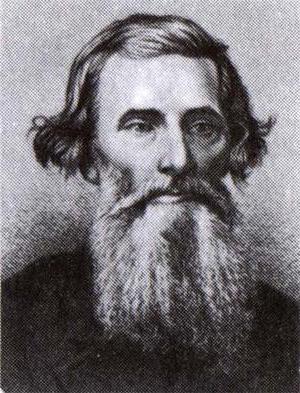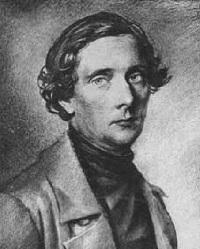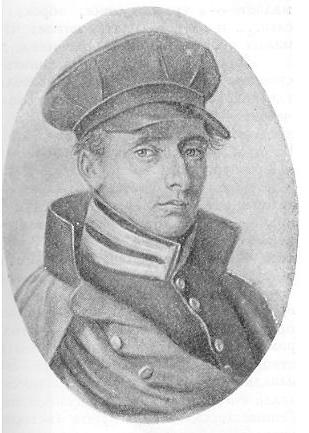Vladimir Ivanovich Dahl, whose biography will be described in this article, is a Russian scientist and writer. He was a corresponding member of the Physics and Mathematics Department of the St. Petersburg Academy of Sciences. He was among the 12 founders of the Russian Geographical Society. He knew at least 12 languages, including several Turkic. The most famous was the compilation of the Explanatory Dictionary of the Great Russian Language.
A family
Vladimir Dal, whose biography is well known to all fans of his work, was born in 1801 in the territory of modern Lugansk (Ukraine).
His father was a Dane, and the Russian name Ivan took along with Russian citizenship in 1799. Ivan Matveevich Dahl knew French, Greek, English, Yiddish, Hebrew, Latin and German, was a physician and theologian. His linguistic abilities were so high that Catherine II herself invited Ivan Matveevich to St. Petersburg to work in the court library. He later went to Jena to study as a doctor, then returned to Russia and received a medical license.
In St. Petersburg, Ivan Matveevich married Maria Freytag. They had 4 boys:
- Vladimir (born 1801).
- Karl (born 1802). He served in the Navy all his life, had no children. He was buried in Nikolaev (Ukraine).
- Paul (born 1805). He suffered from consumption and, due to poor health, lived with his mother in Italy. I had no children. He died in his youth and was buried in Rome.
- Leo (year of birth unknown). He was killed by Polish rebels.
Maria Dahl knew 5 languages. Her mother was a descendant of an old family of French Huguenots and studied Russian literature. Most often, she translated the works of A.V. Iffland and S. Gesner into Russian. Grandfather of Maria Dahl - pawnshop official, college assessor. In fact, he forced the father of the future writer to get the profession of a physician, considering it one of the most profitable.
Study
Vladimir Dal, whose brief biography is in textbooks on literature, received primary education at home. Parents from childhood instilled in him a love of reading.
At 13, Vladimir, along with his younger brother, entered the St. Petersburg Cadet Corps. There they studied for 5 years. In 1819, Dahl graduated as midshipman. By the way, he will write about studying and serving in the navy 20 years later in the novel “Michman Kisses, or Look Back at Zhivuchi”.
Having served in the Navy until 1826, Vladimir entered the medical faculty of the University of Dorpat. He made a living by giving Russian language lessons. Due to lack of funds, he had to live in an attic room. Two years later, Dahl was enrolled in state-owned post-graduate students. As one of his biographers wrote: "Vladimir plunged into study with his head." He especially leaned on the Latin language. And for his work on philosophy he was even awarded a silver medal.
I had to interrupt my studies at the start of the Russian-Turkish war in 1828. In the Transdanubian region, cases of plague increased, and the army needed to strengthen the medical service. Vladimir Dal, whose brief biography is known even to foreign writers, passed the exam for a surgeon ahead of schedule. His dissertation was entitled "On a Successful Method for Trepanation of the Skull and on Hidden Ulceration of the Kidney."
Medical activity
During the battles of the Polish and Russian-Turkish companies, Vladimir showed himself to be a brilliant military doctor. In 1832, he got a job as an intern at the St. Petersburg hospital and soon became a well-known and respected doctor in the city.
P. I. Melnikov (Dahl’s biographer) wrote: “Moving away from surgical practice, Vladimir Ivanovich did not leave medicine. He found new passions - homeopathy and ophthalmology. "
Military activity
Dahl's biography, a brief summary of which shows that Vladimir has always achieved his goals, describes the case when the writer showed himself as a soldier. This happened in 1831 when General Ridiger crossed the Vistula River (Polish company). Dahl helped build a bridge over it, defended it, and destroyed it after crossing. For failure to fulfill direct medical duties, Vladimir Ivanovich received a reprimand from his superiors. But later the tsar personally awarded the future ethnographer the Vladimir Cross.
The first steps in the literature
Dahl, whose brief biography was well known to his descendants, began his literary work with scandal. He composed an epigram on Craig, the Commander-in-Chief of the Black Sea Fleet, and Julia Kulchinskaya, his common-law wife. For this, Vladimir Ivanovich was arrested in September 1823 for 9 months. After the acquittal of the court, he moved from Nikolaev to Kronstadt.
In 1827, Dahl published his first poems in the journal Slav. And in 1830 he revealed himself as a prose writer in the novel “Gypsy”, published in the Moscow Telegraph. Unfortunately, within the framework of one article it is impossible to tell in detail about this wonderful work. If you want more information, then you can turn to thematic encyclopedias. Reviews of the story can be in the section “Dal Vladimir: biography”. For children, the writer also compiled several books. The first success was the most successful, as well as another first.
Confession and second arrest
As a writer Vladimir Dal, whose biography is well known to all students, became famous thanks to his book "Russian Tales", published in 1832. The rector of the Derpt Institute invited his former student to the department of Russian literature. The book of Vladimir was accepted as a dissertation for the degree of Doctor of Philosophy. Now everyone knew that Dahl was a writer, a biography which is an example to follow. But trouble happened. The work was rejected by the Minister of Education as unreliable. The reason for this was the denunciation of official Mordvinov.

Dahl's biography describes this event as follows. At the end of 1832, Vladimir Ivanovich made a tour of the hospital in which he worked. People in uniform came, arrested him and took him to Mordvinov. He attacked the doctor with an area of abuse, brandishing Russian Tales in front of his nose, and sent the writer to prison. Vladimir Zhukovsky helped, who at that time was a teacher of Alexander, the son of Nicholas I. Zhukovsky described to the heir to the throne everything that happened in an anecdotal light, describing Dahl as a modest and talented person, awarded with medals and orders for military service. Alexander convinced his father of the absurdity of the situation and Vladimir Ivanovich was released.
Acquaintance and friendship with Pushkin
Any published biography of Dahl contains a moment of acquaintance with the great poet. Zhukovsky repeatedly promised Vladimir that he would introduce him to Pushkin. Dahl was tired of waiting and, taking a copy of "Russian Tales", which were withdrawn from sale, went to introduce himself to Alexander Sergeyevich on his own. Pushkin, in response, also presented a book to Vladimir Ivanovich - “The Tale of the Priest and his Worker Balda”. Thus began their friendship.

At the end of 1836, Vladimir Ivanovich arrived in St. Petersburg. Pushkin visited him many times and asked about linguistic findings. The poet really liked the word "crawl out" from Dahl. It meant the skin that snakes and snakes dump after wintering. During the next visit, Alexander Sergeyevich asked Dahl, pointing to his frock coat: “Well, is my crawl good? I won’t crawl out of it soon. I’ll write masterpieces in it! ” In this coat he was in a duel. In order not to cause unnecessary suffering to the wounded poet, he had to “crawl out”. By the way, this case even describes Dahl's biography for children.
Vladimir Ivanovich took part in the treatment of the fatal wound of Alexander Sergeyevich, although the poet's relatives did not invite Dahl. Upon learning that a friend was badly wounded, he came to him himself. Pushkin was surrounded by several notable doctors. In addition to Ivan Spassky (home doctor Pushkin) and the court doctor Nikolai Arendt, there were three more specialists. Alexander Sergeyevich joyfully greeted Dahl and asked with a prayer: “Tell the truth, will I die soon?” Vladimir Ivanovich answered professionally: “We hope that everything will be fine and you should not despair.” The poet shook his hand and thanked.

Being at death, Pushkin gave Dahl his golden ring with an emerald, with the words: "Vladimir, take it from memory." And when the writer shook his head, Alexander Sergeyevich repeated: “Take it, my friend, I am no longer destined to compose.” Subsequently, Dahl wrote about this gift to V. Odoevsky: “As I look at this ring, I immediately want to create something decent.” Dahl visited the poet’s widow in order to return the gift. But Natalya Nikolaevna did not accept him, saying: “No, Vladimir Ivanovich, this is for you to remember. And yet, I want to give you his coat pierced by a bullet. " It was the above-crawled frock coat.
Marriage
In 1833, Dahl's biography was marked by an important event: he married Julia Andre. By the way, Pushkin himself personally knew her. Julia conveyed her impressions of meeting the poet in letters to E. Voronina. Together with his wife, Vladimir moved to Orenburg, where they had two children. In 1834, the son Leo was born, and after 4 years - the daughter Julia. Together with the Dahl family, they were transferred as an official for the execution of special orders under the governor V. A. Perovsky.
Ovdovev, Vladimir Ivanovich married again in 1840 to Ekaterina Sokolova. She gave birth to the writer three daughters: Maria, Olga and Catherine. The latter wrote memories of her father, which were published in 1878 in the journal "Russian Herald".
Naturalist
In 1838, for the collection of collections on the fauna and flora of the Orenburg Territory, Dahl was elected a corresponding member of the Academy of Sciences at the Department of Natural Sciences.
Dictionary
Anyone who knows the biography of Dahl knows about the main work of the writer - "Explanatory Dictionary". When it was assembled and processed to the letter “P”, Vladimir Ivanovich wanted to resign and fully concentrate on working on his brainchild. In 1859, Dahl moved to Moscow and settled in the house of Prince Shcherbaty, who wrote The History of the Russian State. The last stages of work on the dictionary, which is still unsurpassed in volume, have passed in this house.
Dahl set himself the tasks that can be expressed in two quotes: “A popular living language should become a treasury and a source for the development of competent Russian speech”; “General definitions of concepts, objects, and words are an impossible and useless affair.” And the more common and simpler the subject, the more sophisticated it is. Explanation and transmission of the word to other people is much more intelligible than any definition. And examples help clarify matters even more. ”
To achieve this great goal, the linguist Dahl, whose biography is in many literary encyclopedias, spent 53 years. Here is what Kotlyarevsky wrote about the dictionary: “Literature, Russian science and the whole society received a monument worthy of the greatness of our people. Dahl’s work will be the pride of future generations. ”
In 1861, the Imperial Geographical Society awarded Vladimir Ivanovich the Konstantinov Medal for the first issues of the dictionary. In 1868 he was elected an honorary member of the Academy of Sciences. And after the publication of all volumes of the dictionary, Dahl received the Lomonosov Prize.
Last years
In 1871, the writer fell ill and invited an Orthodox priest about this. Dahl did this because he wanted to receive communion according to the Orthodox rite. That is, shortly before his death, he converted to Orthodoxy.
In September 1872, Vladimir Ivanovich Dahl, whose biography was described above, died. He was buried with his wife at the Vagankovsky cemetery. Six years later, there they betrayed the earth and his son Leo.